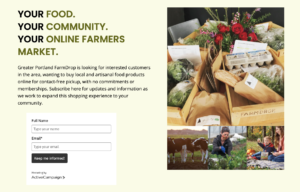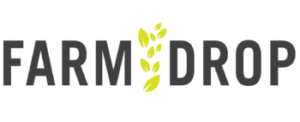How it Works for Market Hub Managers
As a Market Hub Manager, you will operate your own FarmDrop Market Hub as a Business, Non-Profit, or Independent Contractor. You will be able to manage your own hours and Producers, communicate with your Customers via our FarmDrop managed system, and manage your own digital marketing with our guidance. FarmDrop will provide training and guidance for success throughout the whole process.
Once ready, and in order to proceed to onboarding producers, you will sign an MOU with FarmDrop as well as an MOU with the location where your Market Hub is located (if it is with a third party).
After that, the pillars of a successful Market Hub are to engage your stakeholders consistently and with clarity, based on what you know of them, and what FarmDrop knows of our value proposition and how to present it to different parties.
Engage Your Customers:
Early on, FarmDrop activates a Landing Page where you can promote your market with preliminary information, like the first four producers confirmed. You will be using this tool to get potential customers to sign up with their name and email, to receive more info about your market opening. This email sign up tool will build your Email Marketing list on a platform called Active Campaign. This tool will allow you to easily reach your weekly customer base with automated emails announcing your market’s opening and closing times, promotions. Email templates will be provided by FarmDrop to help you get familiar with the different kinds of emails to use.
FarmDrop will also provide you with a guide to setting up social media and building a following there, along with branded content to use in social posts and suggestions for what types of unique content to post as your market gets underway.
MHMs are encouraged to keep customers engaged with their weekly FarmDrop offerings through all their channels. The following are related to how you want to design your market hub based on what you are hearing from customers.
Design Your Product Variety: what do customers want?
Once you have contacted and secured producers for your Market Hub, you will start to engage producers with a sign up process that helps to gauge interest, products and quality. They join an orientation process to learn more about FarmDrop, they fill out a form on the training platform, and then are invited to set up their online accounts and stores on FarmDrop.us. Here, they will set up their product lists, upload pictures and adjust stock levels, and then FarmDrop manages their weekly sales, inventory, and all payment processing.
Set Up Your Weekly Schedule: how do customers want it?
 An agreed weekly order window will be established for your Market. There is an open and close day for customer shopping and a designated day for customer pick-up. Producers will drop products off in a designated location, the Market Hub Manager will organize orders per customer from a downloadable report, and customers will pick up pre-packed orders during the pick-up window. The order cycle should allow 24-36 hours for order fulfillment by producers, during which the site is closed for ordering. Some Market Hubs operating as online Farm Stands fulfill their orders on a daily basis. Once the launch date is set, equipping the space and setting up the operations of the order fulfillment will be the final step. There might be some fine tuning needed over the course of the first two weeks as everyone gets used to the new FarmDrop market.
An agreed weekly order window will be established for your Market. There is an open and close day for customer shopping and a designated day for customer pick-up. Producers will drop products off in a designated location, the Market Hub Manager will organize orders per customer from a downloadable report, and customers will pick up pre-packed orders during the pick-up window. The order cycle should allow 24-36 hours for order fulfillment by producers, during which the site is closed for ordering. Some Market Hubs operating as online Farm Stands fulfill their orders on a daily basis. Once the launch date is set, equipping the space and setting up the operations of the order fulfillment will be the final step. There might be some fine tuning needed over the course of the first two weeks as everyone gets used to the new FarmDrop market.
Automated Payment System:
Market Hub Managers and Producers will need to create a Stripe account, by going to Stripe.com. Producers benefit from an automated payment processing system, retaining 90% of their listed price (not including Stripe CC payment fees of 2.9% + 0.30cents) and Market Hub Managers are paid $4.50 per order, as a ‘pick up fee’ paid for by the customers, similar to a shipping + handling fee. Sales and Settlement Reports are available through our system, for easy accounting, and refunds are managed as needed directly by producers.
Create a Stripe account for your Market Hub, link found here.
*If you are a Producer on your market you might need two accounts
Get Familiar with FarmDrop Tools
 FarmDrop provides Market Hub Managers with all the necessary tools for training and onboarding producers and customers, as well as a tech support platform, help.farmdrop.us and a direct email help@farmdrop.us where you can always reach out with any questions. The following are the different tools you will become familiar with to run your Market Hub:
FarmDrop provides Market Hub Managers with all the necessary tools for training and onboarding producers and customers, as well as a tech support platform, help.farmdrop.us and a direct email help@farmdrop.us where you can always reach out with any questions. The following are the different tools you will become familiar with to run your Market Hub:
- G-Suite > your own @farmdrop.us email
- FarmDrop Training Tools > your own training platform
- FarmDrop Help Desk > a tech support step-by-step guide
- Active Campaign > your own Active Campaign Sales and Marketing account
- Instagram / Facebook > customized “Location FarmDrop“ social media pages
- FarmDrop.us Marketplace > a customized “Location FarmDrop” marketplace
We will provide information and support on how to use these tools along the way.
Build Community
FarmDrop is built upon the mission of establishing Community Partnerships with allied organizations, community leaders, and networking institutions. Driving these partnerships allow opportunities for cooperative programs, promotions, marketing opportunities, and co-sponsored events once the site and/or marketplace is live.
The expectations are for diverse community partnerships and networking to build up around FarmDrop. Organizing around a new tool is an opportunity to provide a new system for engaging, bringing new air into old relationships, and focusing on a collaborative approach that is guided by friction less partnerships. FarmDrop embodies the understanding that transparency and collaboration serve everyone.
Fundraising + Community Involvement
FarmDrop is also a fundraising tool for amplification of partner organizations in several different ways. There are many opportunities to lift each other up, as well as many initiatives in the community. FarmDrop’s commitment to collaboration is one of the most essential attributes of our organization and can be used as a selling point to customers who choose products with a mission – and – it is a way to actually help a local economy & culture thrive.
The MHM role is one that truly knows how to collaborate and build a community around a shared goal, while also leading a successful side-business and supporting local farm viability.
You’re ready for the next step!
